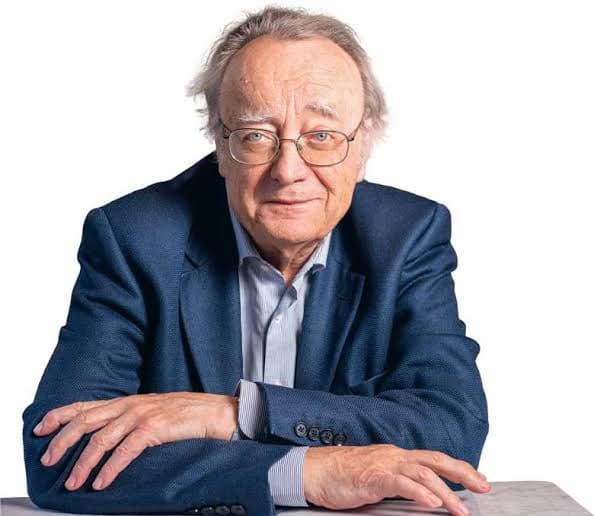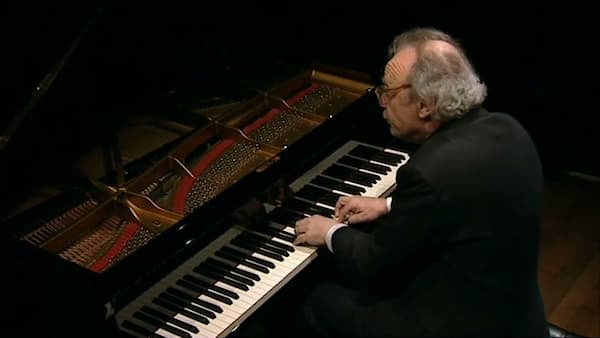Alfred Brendel, who passed away at the age of 94 in June 2025, was not merely a pianist but a towering figure in classical music whose intellectual depth, technical mastery, and poetic sensibility left an indelible mark on the world. Born in 1931 in what is now the Czech Republic, Brendel forged a singular path through the postwar musical landscape, becoming one of the greatest interpreters of Beethoven, Schubert, and Mozart.
Alfred Brendel Plays Piano Sonata No. 20 in A Major, D 959
Crafting Musical Narratives

Alfred Brendel
His performances were not just concerts but profound dialogues with the music, marked by a clarity that seemed to illuminate the very architecture of each composition. Audiences didn’t come for the man, they came for the music.
Alfred Brendel’s virtuosity was undeniable, but it was never about showmanship. Every note he played was rich and expressive, never indulgent and his interpretations commanding, yet free of pretension. Brendel’s performances were masterfully shaped, each one a journey with a clear sense of purpose.
But what truly set him apart were the countless subtle decisions, his phrasing, the contrasts he drew, the delicate shifts in tone. He never raced through a piece, yet the sheer depth of detail he revealed made it feel as though the listener was constantly discovering something new, moment by moment.
Alfred Brendel Plays Beethoven’s Piano Sonata No. 32 in C minor, Op. 111
Revelatory Art
Brendel made the familiar seem revelatory. In his performances of Beethoven, according to a critic, he projected “an X-ray picture of each sonata onto a screen,” revealing the inner workings of the music with surgical precision yet profound emotion.
This intellectual approach earned him the moniker of the “philosopher’s pianist,” a title he wore with pride but also with a characteristic twinkle of self-awareness. Brendel himself once remarked, “The word LISTEN contains the same letters as the word SILENT,” a pithy encapsulation of his belief that true musical understanding begins with attentive stillness.
Pianists across generations have cited Brendel as a beacon of inspiration. Mitsuko Uchida, the renowned Japanese-British pianist, praised his ability to balance structure and spontaneity. “Alfred had this extraordinary gift of making every note speak, yet never losing the thread of the composer’s thought. His Beethoven was like a conversation with the divine, rigorous, yet utterly human.”
Uchida’s words echo the sentiment of many who saw Brendel’s performances as a masterclass in musical storytelling, where technical brilliance served the purpose of uncovering the philosophical underpinnings of the score.
Alfred Brendel Plays Mozart’s Piano Sonata No. 14 in C minor, K. 457
Blending Intellect and Artistry

Alfred Brendel
Brendel’s influence extended beyond the stage through his erudite writings. His essays, collected in a number of books, are celebrated for their wit and insight. His former student Till Fellner wrote, “His words were as illuminating as his playing. He taught us that to play Schubert is to suspend gravity, to let the music float in a dreamlike state.”
His approach was not without its detractors. Some found his meticulous style too cerebral, lacking the fiery abandon of other postwar titans. Yet even those critics acknowledged his unmatched ability to reveal the music’s inner logic. Pianist András Schiff, reflecting on Brendel’s legacy, noted, “He showed us that intellect and emotion are not opposites but partners. His Mozart was playful yet profound, like a poet who knows when to smile.”
Brendel’s life was as rich as his music. Raised in Zagreb and later based in London, he was a polymath who could have excelled as a poet, painter, or author. His lectures and masterclasses were legendary, filled with anecdotes delivered with a dry wit that disarmed audiences.
Pianist Imogen Cooper recalled, “I once attended a masterclass where he spent 20 minutes on a single phrase in Beethoven, dissecting it with the precision of a surgeon and the passion of a poet. We were all spellbound.”
Alfred Brendel Plays Schubert’s Four Impromptus, D. 935
Profound Legacy
His recordings remain benchmarks, yet he remained humble and emphasised the music over the performance. “Self-discovery is a slower process but a more natural one,” he wrote, a reflection that applied as much to his own career as to his advice for young pianists.
Alfred Brendel had the ability to make the music feel both timeless and immediate, as each performance was an act of discovery. Yet, his legacy is not just in the notes he played but in the ideas he championed.
For Brendel, music was a journey of the mind and heart, that listening demands silence, and that grace is a form of strength. As Richard Morrison wrote, “Brendel’s encounters with music were transformative, not just for him but for all who listened.”
In an age of distraction, Brendel’s legacy invites us to slow down, to truly listen, and to seek depth over spectacle. Through his playing and his writing, he offered not just sound but insight, essentially a voice of enduring clarity that will resonate through generations.
For more of the best in classical music, sign up for our E-Newsletter



I had the pleasure of playing with Brendel on numerous occasions with the Orpheus Chamber Orchestra. On one USA tour, we were playing Schoenberg’s Kammersymphonie, Op.9 on the second half after Brendel’s Mozart or Beethoven concerto. At intermission, he would request a Schoenberg score from our librarian and proceed into the audience to listen to our performances. A true artist and lovely human being. RIP.
I first encountered Grand Pianist, Alfred Brendel, in London, UK, whilst being filmed by BBC London for their “Omnibus Television Series” under Producer, Jamilla Patten, who was a fervent musician Fan of Alfred Brendel, telling me & most often of her conversations with the Maestro, Brendel, and of his superior intellect in making Music yet not only a matter of cerebral intellect but from the Heart at the Root of Intellect, or as Albert Einstein, once suggested Intellect if from the human heart determines ‘Intellect’ yet a most human emotion of Heart and Soul ~ The Passing of a Titan of the Piano is sincerely difficult to absorb because Alfred Brendel was Always ‘There’ and later on Here in Chicago at the University of Chicago as a welcomed Professor of Piano and Grand Artist & whom gave Concert Lectures on his deepest beloved &
known so closely Composer Hero’s including beloved Beethoven, Mozart and Schubert to name but a few!! It seemed to me, a Violinist and Original Artist Pupil of Jascha Heifetz, (& later in London, private 1st Heifetz Pupil of Nathan Milstein),that Alfred Brendel was wholly At Home in the University of Chicago Music Department headed by Barbara Shubert, the Music Director of the University of Chicago Orchestra and one of the Light’s Within the School of Music noted as the Hub
of musical intellectual curiosity and studies certainly within the City of Chicago bar non … It might serve your Magazine most well to reach out to Barbara Shubert for her ‘Read’ of Alfred Brendel for she worked with him quite frequently. I also feel UK Jamilla Patten, might be a wonderful resource for any wishing to write some sort of Book on The Life of a Great Twentieth & into Twenty First Century, Grand Pianist who in his own ‘Silent’ way dominated the Musical History Community via his vast understanding and love of Music for the Piano of Beethoven, Mozart and Schubert plus other Piano Giant’s Composition! As a younger concert artist I had less interest in Brendel, but now, as a Veteran Concert Artist I have much interest with an Overview of What Music & the Transferring of it means in a Life of those committed to sharing their Art on a concert instrument, aka, Violin/ Piano/ Horn/ Voice/ Guitar Classical plus Violoncello, with Life growth in each artist’s artistic Journey throughout their own individual lives here on Earth with Thankfulness to a Higher Power. Yours respectfully, with compliments to the Author of this Tribute to newly late Pianist, Alfred Brendel, sorely missed.
As from ~ Elisabeth Matesky, Original Pupil of Jascha Heifetz {Film on YT titled in Russian/Orig English) globally recognised Concert Violin Soloist throughout the mid 60s until 1st 1/3 Twenty First C.- Master Teacher/Carrier Heifetz-Milstein Violin Art Bowing Legacy ~ Ref: https://www.facebook.com/elisabeth.anne.775?fref=nf Photo: TWH/w POTUS #39, Jimmy Carter/French Premier, Raymond Barre, applauding yours truly Finale/Ysaye’s Solo Violin ‘Ballade’! Submitted Friday, 27th of June, anno 2 0 2 5 / US ~